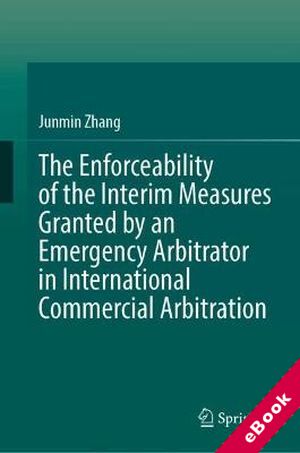
The device(s) you use to access the eBook content must be authorized with an Adobe ID before you download the product otherwise it will fail to register correctly.
For further information see https://www.wildy.com/ebook-formats
Once the order is confirmed an automated e-mail will be sent to you to allow you to download the eBook.
All eBooks are supplied firm sale and cannot be returned. If you believe there is a fault with your eBook then contact us on ebooks@wildy.com and we will help in resolving the issue. This does not affect your statutory rights.
This timely book offers a comprehensive study of the emergency arbitrator mechanism that provides interim measures in international commercial arbitration before the constitution of an arbitral tribunal, focusing on the enforceability of the interim measures granted. Based on the traditional legal doctrines of private international law, international dispute resolution, and arbitration law, this book is featured mainly in comparative studies.
Six leading arbitral institutions are chosen to conduct systematic research on applying the emergency arbitration rules to establish a general and common procedural framework for emergency arbitration in discussion. Normative and comparative law analyses investigate the status quo of available legal instruments used to recognize and enforce interim measures in emergency arbitration by examining international conventions and three representative chosen jurisdictions, i.e., Singapore, Mainland China, and the USA. Following these two levels of comparison, it highlights and examines the potential doctrinal and practical barriers that may impact the enforceability of interim measures rendered by an emergency arborator. Finally, it proposes various approaches that could be used to improve the enforceability controversy, and it offers innovative suggestions for further research.
This book is of particular relevance and interest to students, researchers, and practitioners in dispute resolution and arbitration law, as well as policymakers, legislators, and arbitral institutions considering further reform in international arbitration.